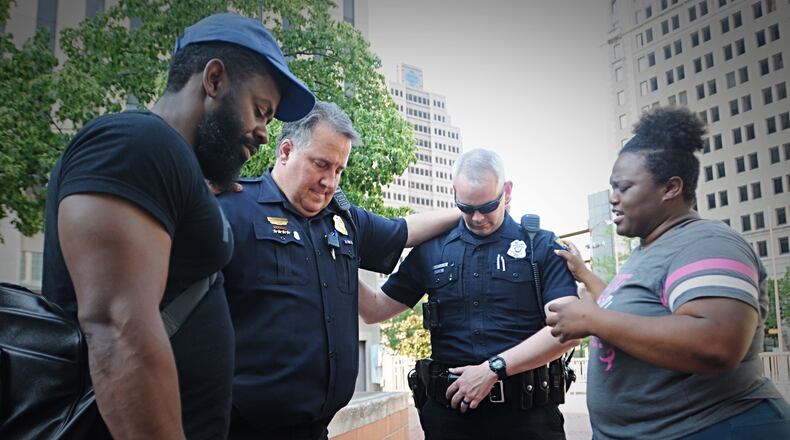Throughout the piece, Whaley repeated the fairytale version of American racism—wherein mistakes “were” made, but no one is ever responsible—while deftly removing her own actions along with those of the University of Dayton’s from scrutiny.
She speaks proudly of “the Roots of Racism” web series that premiered in October. It was a partnership between the Dayton Daily News, the University of Dayton, and city leaders, ostensibly to help Daytonians understand the history of racism in this region.
But the mayor and the university both used the series as an opportunity to frame systemic racism as a thing of the past, a vestige of a time when no one knew any better—rather than taking responsibility for how the city’s actions and the university’s business model continue to promulgate a segregated region.
A university, after all, that continues to produce black undergraduates at single digit rates in a city more than 40 percent black is little prepared, it seems, to offer lectures on past discrimination. UD president Eric Spina even offered an “apology” for his institution’s racist past, but sidestepped any talk of what the university might be doing right now to cement yet another generation of discrimination. The predominately white class that will graduate this year will be in the board rooms, legal partnerships, and public service leadership roles of the future. But well-meaning white people don’t like to think that this is also how racism works.
One of the ways we can evaluate the authenticity of one’s commitment to equality and justice is to evaluate how white people in power handle critics, particularly Black critics.
You’ll recall that former Community Police Coordinator Jared Grandy resigned this summer when his attempt to represent the people of this community fell on deaf ears. At the same time, the mayor and the city manager heaped praise upon a police chief whose Department used escalatory tactics and draconian measures to crush peaceful dissent on Wayne Ave during the George Floyd uprisings.
It’s clear that Grandy was being sidelined before his resignation because he had the temerity to speak out on behalf of people in Dayton most likely to face unjust police action. He’s one of the few public figures I know of in this town who, when presented with a choice between a high-paying job and the people he represents, went with the people.
Whaley would rather not talk about this history, however, preferring to applaud the efforts of Will Smith, a Dayton school board member who’s being paid $125,000 to provide “comprehensive organizing, engagement and consulting” for the City Commission’s five-point policing agenda. Why does the City of Dayton, which already houses the Human Relations Council and the Community Police Council, need a six-figure contract to duplicate efforts it already has a staff to be engaged in?
It’s not to change the way Black communities are policed in the Dayton region. It’s to ensure that the mayor, city manager, and even the police chief are able to choose the Black voices worthy of highlighting.
That $125,000 could have gone to the HRC or the CPC, but instead it’s going to one man who presumably isn’t incentivized to offer sharp critique of the City’s efforts.
The mayor wrote in her column about “uncomfortable truths” surrounding this region’s racism. The most uncomfortable truth that she would like to avoid is this: Dayton’s most respected institutions, from her own office to the City Commission to the University of Dayton, continue to lay more bricks in the foundation of racial segregation in this region.
Perhaps it is laudable that white leaders are publicly talking about Dayton’s racist history. But true progress is only possible when these same leaders find the courage of self reflection and realize how they are, on this very day, a part of the problem. No amount of six-figure contracts can buy one out of that truth, older than the American republic itself.
Jason Harrison co-owns Present Tense Fitness, a gym in Dayton’s historic Oregon District neighborhood.
ADD THIS NOTE IN A BOX
Note from Community Impact Editor Amelia Robinson: In a guest column “‘Roots of Racism’ series a call to action for entire region (Sunday Dec. 27),” Dayton Mayor Nan Whaley discussed the city’s police reform plan, the importance of studying the past to improve the future and the need for a regional response to address racism. Find Whaley’s complete piece on DaytonDailyNews.com. City officials say Will Smith, a Dayton school board member and community organizer, has been contracted to work on police reform, a neighborhood safety planning and with the Human Relations Council. He is helping to facilitate discussions between more than 100 Dayton citizens - some of whom have been critical of Dayton - working on police reform, they say.
About the Author


